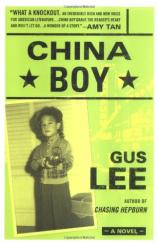Reading Group Guide
Discussion Questions
China Boy

1. Discuss the children’s roles in Kai’s family before Mah-mee dies. What is the importance of birth order in the family? Why is Megan treated differently? Why is Kai protected and favored? In what ways does Mah-mee prepare or leave them unprepared for the realities of American life? In what ways are Kai’s sisters more prepared than he is?
2. “I think I know why my father became a soldier, a professional fighter, an iconoclast. My mother was not impressed with Father’s career choice” (p. 33). Why does Kai’s father become a soldier? Why does Kai sympathize with this decision? Why would Mah-mee not be impressed? In what ways are Kai’s parents fundamentally different? What does each bring to Kai’s life?
3. Kai’s mother longs to return to China, but the family stays in San Francisco. Why? Why is Kai’s father so obsessed with America? How does this play out while Mah-mee is alive and then after she dies? In what ways is Kai’s father blinded by his desire to have an American family?
4. Before she dies, Mah-mee’s main source of company is Kai. She takes him with her everywhere and does not let him go outside to play with the neighborhood children. How does this keep Kai from adapting to American culture? How does this hurt him later? Do you think Mah-mee was wrong to keep Kai so close to her? Why or why not?
5. Discuss Mah-mee’s obsession with education and writing. How does Uncle Shim later maintain her traditions? Do you think it is important for Kai to remain in touch with his Chinese roots in this way? Do you think that it will ultimately help or hinder him?
6. After Mah-mee dies, Edna throws Kai onto the San Francisco streets where he is beaten by other children. Why is Kai a target for these children? Why does Edna keep him out of the house? Why is Edna herself so violent toward Kai and Janie? Why doesn’t their father intercede?
7. Kai speaks often of the difference between meals before and after Edna. How are traditional Chinese meals different than meals with Edna? Why is Edna so opposed to them eating Chinese food? Ultimately, what is the importance of food to Kai? How does he learn to love food and those who feed him?
8. Why does Edna send Kai to all the churches in the Panhandle? What does religion mean to the various people in his neighborhood? To the men at the Y? Do you think Kai ever really learns faith?
9. How does Toussaint’s friendship change Kai? What does he offer Kai? Why is he willing to take Kai on as a friend when no one else is?
10. “Kids learned to make their own music, without radios. . . . Kids, even poor and unhappy ones, loved to sing, warbling the purity of expression, the unsullied and miraculous of a child’s honesty” (p. 105). Were you surprised by this passage? Why does the author place this passage in the story? What other nonviolent expression exists in Kai’s world?
11. Where does Kai find sanctuary? What do these sanctuaries come to mean to him? How, in the end, do they help him to survive?
12. When Tony asks Kai his first name, why does he reply, “China Boy” (p. 220)? Why not tell his given name? How are names used and adapted in Chinese culture? In what ways does Kai relate more to the street name he is given by his enemies than to the name his mother gave him?
13. Why does Uncle Shim take Kai to the chess club? Why is it important for Kai to go? What is Uncle Shim trying to show him?
14. Kai considers the anger of boxers, and how they need this to be good and to win. Does Kai have this anger? Why? When he finally takes on Willie Mack, who and what else is he fighting for?
15. How does Kai’s need for Uncle Shim conflict with the life he’s created at the Y? In what ways are the men at the Y “Chinese uncles” to Kai? How does Kai finally rationalize using violence, even when Uncle Shim tells him not to? How does Kai learn to reconcile these two very different forces in his life?
16. Why does Kai take on Willie? How is he proving himself to the other children in the Panhandle? What does he prove to himself? Do you think it was the right thing for Kai to do? Was there any way for Kai to end the violence toward him without resorting to violence himself?
17. How does the Y change Kai? What do his coaches there give him that he can’t get at home? Besides the ability to fight, what does Kai learn from the art of boxing?
18. Have you known a Toussaint, a Mrs. LaRue, a Hector, an Angelina or a Tony in your life? What impact did they have on you? On your values? On your behaviors? On your selection of friends? Have you known an Edna, a Big Willie or a Devil? How did they impact your life? Have you ever been a Toussaint or a Tony? What would that mean for the person you helped? What would it mean for you?
China Boy
- Publication Date: January 1, 1994
- Paperback: 336 pages
- Publisher: Plume
- ISBN-10: 0452271584
- ISBN-13: 9780452271586






